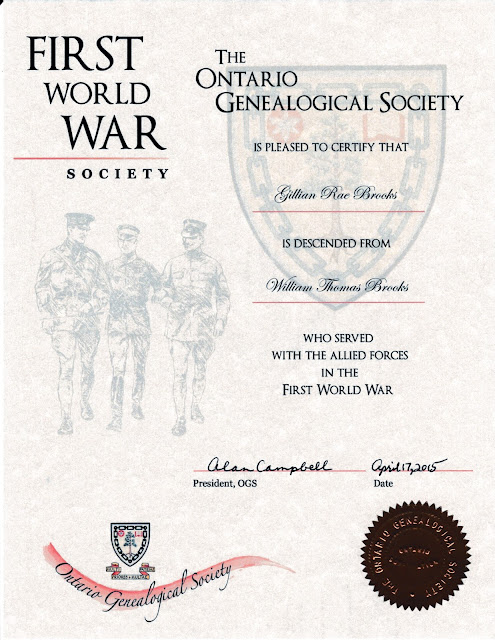 |
| From the writer's collection |
Remembrance Day is very important to me. I am the daughter and grand daughter of men who served in both World Wars. Their service and sacrifice was valued at the time and I'd like to do my part to have it remembered.
This post is about my father Gordon Russell Brooks.
My father was born on August 17th 1922. He was 17 years old when Canada joined World War Two on September 10th 1939. Joining up was always on his mind but he continued on with his education, graduating from East York Collegiate with his junior matriculation (grade 12) in June 1940. His dream was to attend the University of Toronto to continue with the music studies he had begun at the Royal Conservatory of Music but unfortunately he could not afford university at that time. Toronto was still in the grips of the Depression and money was scarce. The economic situation was a big part of so many young men and women enlisting in the war.
The story my dad always told was that he kept trying to enlist until they dropped the height requirement down low enough (my dad was only 5'2"). In the meantime he worked as a piano teacher and as a clerk at Harry Boddy & Co, then at Birks (then Birks-Ellis-Ryrie), both jewellery companies. As an aside, my father's name is on a plaque listing Birks' employees who served in World War Two. We were able to see the plaque when the store was first moved to the Eatons Centre from Yonge Street. Not sure where it is now as the store has severely downsized. Wish I'd taken a picture!
On May 25th 1943 Russ successfully enlisted. He spent 9 months in Canada before shipping out to the UK on February 16th 1944. Another story he used to tell centered around his stint in basic training at Camp Borden near Barrie. He was not much of a marksman and claims that he only passed the shooting exam by hitting the target of his neighbour. After that his rifle was taken away from him and he joined the Royal Canadian Army Medical Corps as a clerk. As the initial interview noted "he does not seem to be an aggressive type" and lucky for us he had a clerical position.
 |
| From the writer's collection |
After landing in England Russ spent 6 1/2 months waiting to sail to Europe. On September 6th 1944 he landed in France. I remember him telling me that even though it was three months after D-Day there was still fighting going on. Russ spent the next year in France, Belgium and England. VE day was May 8th 1945. My dad was in London on that day and claims to have seen Winston Churchill drive by looking quite happy. According to his military file he was granted 9 days leave in the UK starting May 3rd 1945 so it is quite possible he did see the Prime Minister on that day. On his return to France he volunteered for the Pacific Theatre but that transfer was not to be. On July 6th 1945 he was transferred to the Royal Canadian Army Service Corps and promoted to Corporal on July 19th 1945. Russ spent the last months of his was service in the Provost Corps as part of the military police. Here's a photo of him in his Jeep. He always joked that he had a strapping private in the jeep to do the hard work such as arresting delinquent soldiers. He finished the war as a Sergeant.
 |
| From the writer's own collection |
My dad was discharged on August 23rd 1946 returning to Toronto. These are his ID tags. He received the 1939-45 Star, France-Germany Star and Canadian Volunteer Service Medal.

 |
Above all from the writer's own collection
|
Ironically Russ returned from France without a scratch. However, he became ill with rheumatic fever upon his return to Canada and was admitted to Sunnybrook Hospital as one of the first veteran patients. For some reason the doctors decided to operate on his knee and he was left with a limp for the rest of his life. Thanks to the Veteran's Act he was able to fulfill his dream, attending the University of Toronto and graduating with Mus. Bac.
SaveSave














